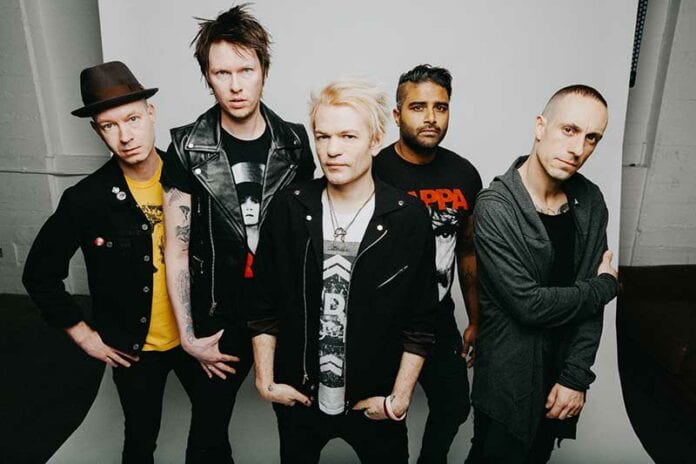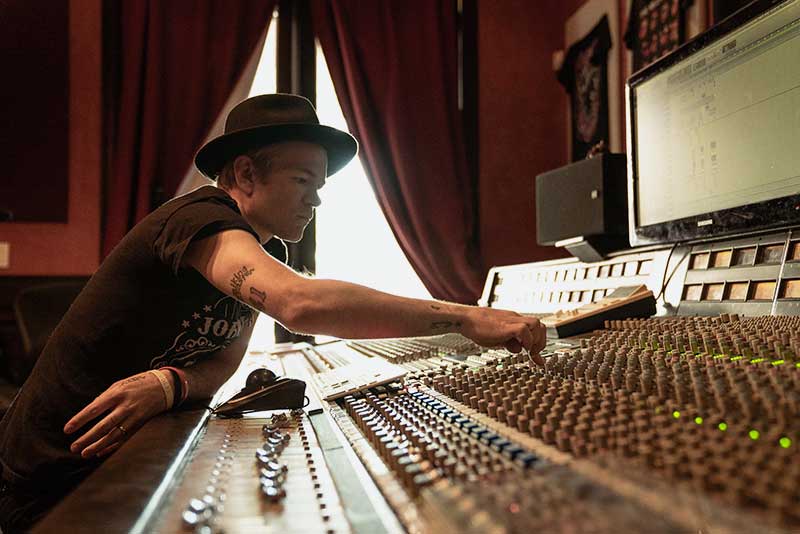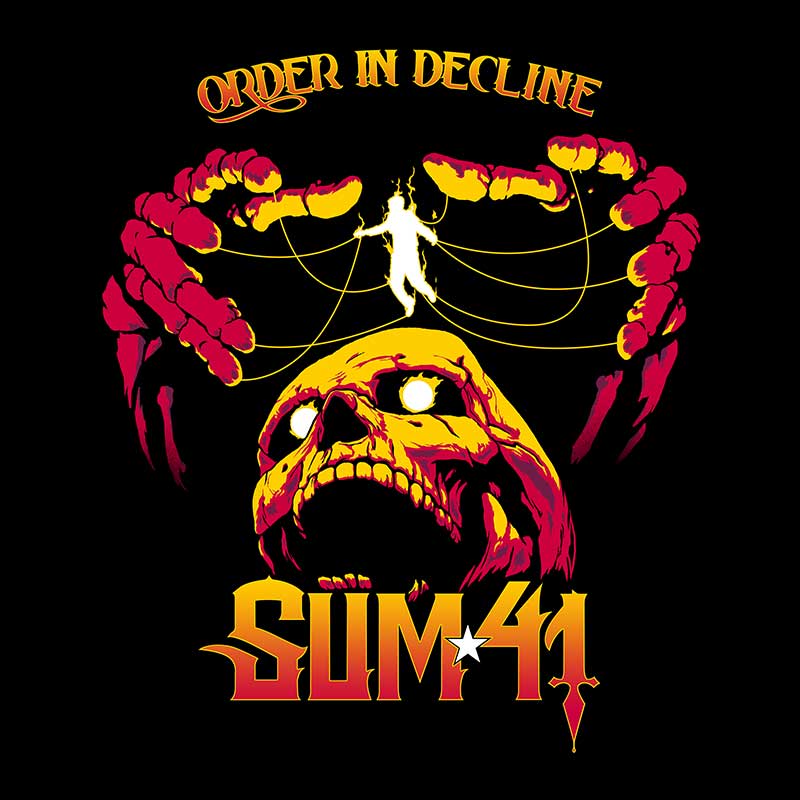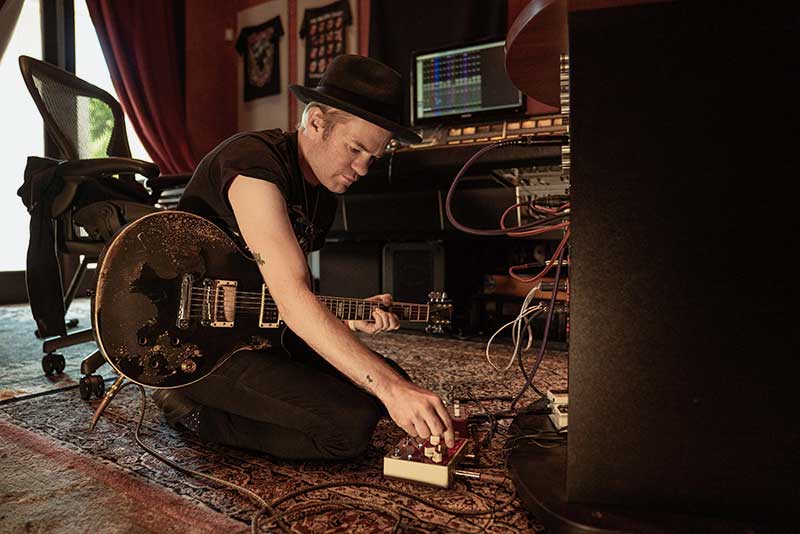
INTERVIEW WITH DERYCK WHIBLEY OF SUM 41 BY ALYSON STOKES
PHOTOGRAPHS BY ASHLEY OSBORN & BENNY GAGLIARDI
It would be an impossible feat to discuss the entire history of legendary rock band Sum 41 in one sitting. Now, the group’s years of touring and 15 million records sold worldwide have culminated into some of their most raw and vulnerable material ever written on their new album Order in Decline. After traveling the world and observing how pervasive division and hate have become across the globe, frontman Deryck Whibley found himself writing about many things he didn’t necessarily want to write about but felt a sense of urgency he couldn’t shake.
Ahead of the July 19 release, we catch up with Whibley to discuss the band’s storied 23 plus year career and find out what makes Order in Decline Sum 41’s heaviest and most aggressive album to date.
For Order in Decline, you came off a massive world tour and went straight into writing. Is that something that’s usual for you? Do you always jump into a new record, or did this album feel so pressing that you felt like you had to do it immediately?
Everything always has somewhat of a different vibe of the way things get done. But, usually, they go right into each other. The only difference I think this time was because I was writing so much on the road. I don’t always do that. I did a lot of that this time because I would come off stage and be really excited about what we were doing and really inspired by the reaction from the crowd every night. So, for some reason I wanted to pick up a guitar when I was on my days off in my hotel room. Fortunately, the way you can do things now is record stuff onto your computer and use some of it later. I did a lot of that kind of stuff. When I got home, I had a lot to go through and start building from. I was really excited. Like I said, we always usually go into the album and the tour and the album and the tour, but this time, I don’t know, I think I was in a much more inspired place.
“I WOULD COME OFF STAGE AND BE REALLY EXCITED ABOUT WHAT WE WERE DOING AND REALLY INSPIRED BY THE REACTION FROM THE CROWD EVERY NIGHT.”
The whole record feels very urgent. Is that what you were experiencing on your off days—you felt you just had to write and get what you were feeling out of your system?
I did, yeah. I knew that I had to. I kept telling myself that I had to. I should take a break, but I just couldn’t. If I tried to mellow out for a day, I couldn’t. I had to just go into the studio and get my ideas down. So, yeah, it felt like I was forced to do it in a way. Luckily, I love what I do.
Kind of like an excited forced.
Yeah. When you start coming up with stuff, and you like what you’re coming up with, it becomes really exciting. I know from experience that doesn’t always happen. Even though I didn’t really give myself any time off, I knew that that stuff would pass.
Was that a new experience—to have all these ideas flood you and feel so urgent like that? Was it overwhelming or welcomed?
Yeah, it was definitely all of that. It was definitely welcomed for sure. It was kind of overwhelming at first. Sometimes in the past, I would be able to write a riff or write a song, and I would be able to do a demo of it right away. Whereas this time, I would write a song, and I’d be done with that, and I’d start writing a new one instantly, then I would get finished with that one and another. I had no time to actually put these demos down.
So, you’re just getting it all out and then, “I’ll figure it out later.”
Yeah. That doesn’t always happen for me.

Have you had any moments in the past where material didn’t come as easy like that?
I find that some songs are really easy, and some songs take forever. Whereas this record, they all kind of poured out. The only time that ever happened to me in the past was on another record called Does This Look Infected, our second record. It was a very similar situation. I was writing a lot of riffs on the road for the All Killer No Filler tour. I was really excited and inspired from that tour because that was our first big album. That was our first album, first big tour, first everything. I had a lot of inspiration, and the same thing happened on this record. I always thought that that would never happen again. And you know, 15 years later it happened.
“A COUPLE OF WORDS WOULD COME OUT, I WOULDN’T KNOW WHAT THEY MEANT, AND I WOULD JUST START FOLLOWING IT.”
What do you think was the cause of that? I know that with traveling the world, you’ve seen issues in different places. Was that what gave you this spark again? Like you said, it’s been years since you felt like you had to write so urgently. What do you think was the major influence that brought that feeling back?
Again, I think it was the touring and the reaction from the fans every night, because the music always comes first. I was writing all these riffs and music without any words, and I didn’t even know what it was going to be about. All the stuff that was coming so quickly was just from the excitement of being on the road, and I wanted to write exciting music. I don’t really know cause. It just kinda came out. I didn’t really think about it. Every time I picked up a guitar, a riff would come out of it. Then I would turn that into a song and focus on the lyrics later. When I got to the lyrics again, I never really sit down and say, “I should write about this,” or, “It should be this.” Words just kind of come out. They sorta fell out. I feel like everything just falls out and I follow it. A couple of words would come out, I wouldn’t know what they meant, and I would just start following it. All of a sudden the song started to take on a theme, and you keep going with it. Sometimes I would not necessarily like what I was writing or writing about, but I liked the words. I was like, “I don’t really want to sing about this. I don’t really wanna talk about this.” But I guess that comes from just sort of paying attention to what’s going on. Again, I don’t really know. A lot of times I don’t even know what it is until it’s fully written.
So, you were so excited, would want to write, would get your guitar, start making some riffs and not even think about what the song was going to be about. And then as that comes, it’s kind of what you’re seeing, what you’re going through and the words then start adding to that. Is that the process?
That’s exactly it. That’s exactly how it happened.
“EVERY PLACE HAS THEIR OWN CAUSE OR SOURCE OF DIVISION AND HATRED OR POLARIZATION, AND IT’S ALL DIFFERENT. BUT IT’S ALL KIND OF THE SAME.”
Were there any specific events that you saw? Divisive situations? Was this the general feeling you were feeling everywhere? How did those words start coming to your music?
Yeah, you do see it everywhere. What I realized with traveling the world is that every place has their own cause or source of division and hatred or polarization, and it’s all different. But it’s all kind of the same. A lot of it stems from racism, and sometimes it’s not. I was in England when the Brexit vote came down, and it just shocked everybody. I was in London that day, and it was just a huge thing. It shocked everybody. Then, you go somewhere else and there’s something else. It was everywhere we went on that whole tour. It was in my face everywhere I went. So, it just naturally kind of came out.
That makes sense. If you’re surrounded by all that, I’m sure it would have to affect you in a certain way because yeah, everywhere has its issues.
Yeah. My original thought was when I’m writing music, that was my escape from it all. But really it just kind of consumed everything I did, and I personally tried to fight it. I didn’t really want to write about some of this stuff, but it took over. I had no choice, really. But, when I tried changing the words, it just started making nonsense, you know? It didn’t sound that good. I didn’t understand what I was saying. The words didn’t really connect well. Nothing worked.

How did you combat that? Have you ever had any other instances where words came out, and you’re like, “I don’t really want to write about that?”
Yeah, it does. You usually lose that battle because you try to change it, and it doesn’t make sense. It doesn’t work, and you don’t feel anything towards it. And then your vocal delivery, at least for me, is not that good because you’re not confident in it.
Aside from those issues, you also get personal with some of your own inner feelings. Is this the most personal you’ve ever gotten on a record?
I don’t know if it is. I think they’re all personal. It just depends on how much it resonates. How much does your story at that moment resonate with people? It’s always personal, but sometimes your life is more interesting at times than others.
“WE DON’T KNOW ANYTHING ABOUT EACH OTHER, BUT WE DO SHARE THIS ONE THING IN THAT WE HAD THIS ONE MISSING PIECE—THIS FATHER-SON RELATIONSHIP.”
I know there is a song about your family and your father. Why write that song now on this record?
Again, just all of it, it just came out. When that song started to come out, I wasn’t even trying to write a song. I sat down at my piano, I was playing for fun, and some melody just came out and I was like, “Well, it’s kind of interesting.” I sang a little bit more and I thought, “Let’s see if there’s something catchy here.” I thought, “I should come up with a couple of words,” and a few words just started to fall out. I went with that. It was only about two minutes of writing. I wasn’t sitting there trying to write songs. It’s like these words quickly came out, and I started saying, “Okay, well, wait.” Cause it seems like I’m writing a song here, and I’ve got some words instantly, so that’s always a good sign. I wrote a couple more words, and I stopped myself right then. I was like, “Oh man, I don’t want to write. I know what I’m writing here. I’m writing about my dad who I don’t know.” I’ve never met him, and I don’t think about it. It’s not even a thought. My mom has been so amazing my whole life and has been my best friend. She’s such a great mom that I’ve never had to think about my dad. I thought, “Well, obviously the song is coming from some subconscious place. So, if it’s coming out of me, what does it really mean to me?” I sat and I thought about it, and I thought, if anything, he must feel way worse than I do because he’s lived his entire adult life not knowing who his son is. He hasn’t been a thought other than every couple of years somebody brings it up or something, and I think about it. But if I really had to really think about it, I thought it was kind of interesting that he and I, we don’t know each other. We don’t know anything about each other, but we do share this one thing in that we had this one missing piece—this father-son relationship. We just don’t have it. And I don’t share that with anybody in my family, obviously, because I know them. And so once I sort of realized that, then I allowed myself to write the song and finish it. Once I finished it, I still never in a million years thought it would be a Sum 41 song. I just thought, “Well, that’s a song. Maybe I’ll give it away. Maybe it’ll be something for something later. I have no idea.” And it wasn’t until I showed my manager the song, and I just said, “Hey, I’ve got this song and I’m thinking about giving it away. Who do you think we could give it to?” We played it, and he listened to it and said, “I don’t understand why you’d give that away.” I’m like, “It’s not a Sum 41 song.” He goes, “Why is it not?” And I said, “Well, it’s not a heavy song. The whole record is on the heavier side.” And he’s like, “It’s one of the heaviest songs on the record. It’s just heavy in a completely different way.” And once he said that, I realized all right, that does make sense actually. It’s going on the record then.
It’s really interesting how music can bring out the things that you don’t think about, but then it’s still in there.
Yeah, definitely.
You have another personal song, the last song, “Catching Five,” which is also not heavy but heavy in a different way. It’s about people that you’ve lost.
It’s a tale of a few stories in a way. It’s getting a lot of emotion out about a lot of things. But mostly if I were to hone it in, it’s a love song about how I couldn’t imagine losing my wife. But yeah, it has a lot of those…I was just like, this is exactly how I feel, just laying it all out, like I’m writing a diary.
Right. Yeah. I mean, I wouldn’t think that was a love song necessarily right off the bat.
See, my wife gets it though. She does because that’s just sort of the way we are. She knows it’s me imagining life without her, and that’s what makes the song sad. That’s the heaviness of it. I would use experiences of my own, experiences of what seemed to be happening and still happening with a lot of…rise in suicide. I myself never suffered from depression and I wouldn’t want to think from that point of view because it wouldn’t be honest. I could only really sort of express my feelings from being the person who would be on the other side of that.

Was there a song most difficult to write on Order in Decline?
I think they all sort of felt the same to me. I think the hardest one was the song called “Never There” about my dad. That was probably the most difficult because like I said, I didn’t want to write it. And when I did, I didn’t want it to be Sum 41 song.
Sum 41 has had such an extensive career. Do you feel more pressured now to perform or make these great songs or change things up? Or is it easier to just be yourself now?
I think it’s a bit of everything. I think we always put pressure on ourselves. I think no matter what, you always want what you’re doing to be the best it can be and be the best thing you’ve ever done. So, there’s always that sort of pressure, but at the same time, I’m just so comfortable with who we are that that allows me to write what I feel like writing. I don’t know if it ever makes things any easier or feel less pressure.

Yeah, you want to make the best music, and even though it’s been 20 years, there’s still that pressure.
I feel like you’re trying to prove yourself every record. At least that’s how I feel. I feel like every record, I treat it like we’re a brand new band and this has to make a lot of noise somehow. I just go for it. There’s no, “Oh, we’ve been doing this for a while.” Every record has to be as strong as they can possibly be.
“THE BAND HAS GROWN MUSICALLY TO WHERE I THINK WE’RE A BETTER BAND THAN WE’VE EVER BEEN.”
That’s a great mindset. I love that. What do you think is the biggest difference between you now and then, as far as songwriting or as Sum 41 in general?
Well, I think as the band goes on and the band has evolved, it’s how we play. But also who’s in the band? We’re a five piece now, which we never really were before. So, I think the band has grown musically to where I think we’re a better band than we’ve ever been. And I think since these guys are all really great players, it makes my job for writing kind of fun and exciting because I know that I’ve got guys that can play things that I could never play, but I can write them or guide them into a certain way, because there’s such phenomenal players.
With Order in Decline turning so personal, do you hope people go deeper with it and take their own interpretations away from the songs?
I think the only thing that you can hope for, the only thing that I always wished for and I don’t even know if it’s possible when you’ve been a band for a long time and you had previous records is that you always wish that people would give it an honest listen. Or, “What does this record make me feel?” Not, “How does this record compare to the last one or does it compare to the first one?” Those kinds of things. Or, “I don’t normally like this band, but I’m gonna give it a listen.” That kind of stuff. I wish that people would give it a good, honest listen, but I don’t know if I can hope for that.




















